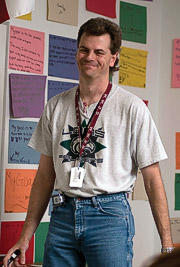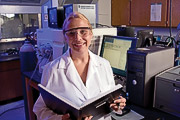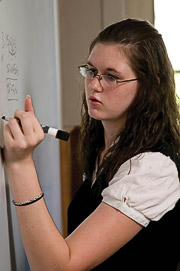 |
|||||||||||||||||

Robert Noyce Scholarship Program Teaching With a Passion
|
Math has always made sense to Heather Rooth ('07). As she was growing up in Oklahoma, she tutored her more arithmetic-averse classmates. And now, as a teacher at North Dallas High School, she's helping students understand crucial concepts they will need to succeed in an increasingly high-tech workforce. "I have those kids who wonder why they need to know math," says Rooth, who teaches Algebra I. "I do the best I can to make it relevant to them. I ask them what job they want to do, and I find some kind of math they'll have to do in that job. "If all else fails, I use a checkbook. You have to be able to balance a checkbook." Filling a need Unfortunately, Rooth's a bit of a rarity. Although math and science skills are more crucial than ever, the teachers needed to teach those subjects are hard to find. School districts across the nation are reeling from a shortage of qualified math and science teachers, a situation made worse by a high attrition rate among beginning teachers. How dire is the problem? Nearly half of all instructors leave the classroom within the first five years, according to a 2006 College Board report.UNT alumni, though, are bucking the attrition trend. More than 85 percent of UNT-trained teachers remain in the classroom three to five years after entering the field. The statistics are not a coincidence. Through grant-funded teacher-training programs such as the Robert Noyce Scholarship, Transition to Teaching and Teach North Texas, the university is making it a priority to develop high-quality educators with math and science degrees and certification in the subjects they teach. And UNT takes its teacher preparation a step further by continuing to aid teachers after they enter the classroom, which, in turn, increases the likelihood that the beginning instructors will have a positive experience and choose to stay in teaching for more than a few years. "I felt prepared to teach because I'd had so much training while at UNT," Rooth says.
A supportive environment However, the teachers aren't pushed blindly into a challenging classroom environment. At UNT, they receive grade-level and assignment-specific professional development. In the teachers' first two years on the job, UNT professors keep in close contact with them and arrange for mentor teachers to answer their questions, provide them with encouragement and track their progress. "I had mentor teachers the first year, and they helped me out a lot by coming to class and giving me feedback," says Lake Dallas Middle School math teacher Casey Harl, a Noyce recipient who earned his teaching certification from UNT in 2007 and is finishing up a master's degree in secondary education. He says Pam Harrell, associate professor of education and principal investigator for the Noyce grant, who also coordinates UNT's Secondary Post Baccalaureate Online Teacher Certification Program and Transition to Teaching grant, continued to be a "tremendous resource" for him after he received his certification.Rooth says her mentor teachers and UNT professors helped her create lesson plans and offered strategies for dealing with particular situations. She also exchanges ideas online through a network of fellow UNT-trained teachers, brought together by UNT faculty members. "It really helps to have somebody to talk to before you try something," Rooth says. New experiences
Science teacher Anna Bayless ('06, '08 M.Ed.) credits a teaching strategies course she took at UNT with giving her practical knowledge — such as laboratory safety guidelines — useful in her role as a chemistry teacher at Plano East Senior High School. Bayless, a third-year educator who previously participated in a Teacher Quality Grant at UNT, spent her summer conducting lab research as part of a College of Arts and Sciences National Science Foundation grant designed to give practicing teachers research experience. "In the program, I get to be more engaged about the whole discovery of science, and I get to bring that to the classroom," Bayless says of the lab research. Another UNT initiative, Transition to Teaching, is a federally funded program geared toward career changers who are pursuing teacher certification — and in some cases certification and a master's degree — to teach math and science in secondary schools. The program annually accepts 15 candidates, who, in exchange for financial assistance, commit to teaching at least three years at high-need campuses in Dallas, Fort Worth, Grand Prairie or Gainesville. During those years, UNT faculty members help steer the teachers around the potential pitfalls that can lead to poor retention rates. For example, it's common for newly certified educators to feel overwhelmed at the seemingly chaotic classroom environment, says Mary Harris, Meadows Chair for Excellence in Education and professor of teacher education and administration. "They plow a much harder path in which support is necessary," Harris says. "Some, I think, have always wanted to be teachers but didn't have a pathway." Expanding the possibilities UNT's newest initiative, Teach North Texas, began this fall with a free 1-credit-hour course designed to allow students to gauge their interest in teaching math, science or computer science. A second free course will be added this spring.
Funded by a $1.4 million grant from the Greater Texas Foundation and a challenge grant of up to $1 million from the National Math and Science Initiative, TNT is a collaborative effort between UNT's College of Arts and Sciences and College of Education that gives students teaching experience as early as their freshman year. The program enables UNT to replicate the innovative UTeach program developed at the University of Texas at Austin. The Greater Texas Foundation Math and Science Scholarship Program awarded UNT another $150,000 grant for the program to fund scholarships over the next two academic years and to grow the endowment for TNT for future years. The university has set a goal of raising at least $1 million for that endowment by 2012, which would then be matched up to $1 million by the National Math and Science Initiative. "With Teach North Texas, future math and science teachers will be prepared for their profession with course work that is guided by current research and is specifically tailored for their field of interest," says John Quintanilla, associate professor of mathematics and co-director of TNT along with Harris. "We think that our students will appreciate the connections between what they learn in Teach North Texas and the multiple field experiences they'll have." About 50 students are in the program this fall, including Courtney Tidwell, a 2008 graduate of UNT's Texas Academy of Mathematics and Science from Arlington. TAMS is the nation's first accelerated residential program for gifted teens who take university courses to complete their first two years of college while earning their high school diplomas. Tidwell says she has long considered majoring in math and becoming a teacher, but the content-area-specific training she will receive through TNT clinched her decision to complete her bachelor's degree and certification at UNT. "When I heard about Teach North Texas, I got pretty excited," Tidwell says. With eager undergraduates such as Tidwell preparing to join the teaching ranks, UNT's impact on the quality of education should continue to grow for years to come. "There's something about teaching that I'm drawn to," Tidwell says. "I feel it's my calling now."
|
||||||||||||||||||||||||||||||||||||||||||||||||||||



